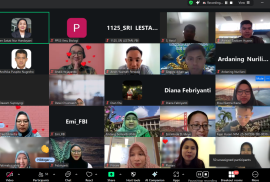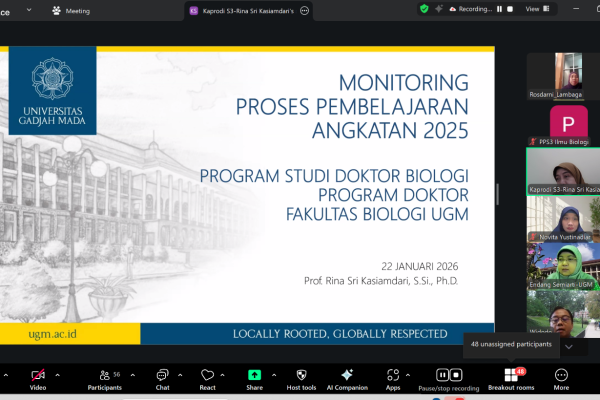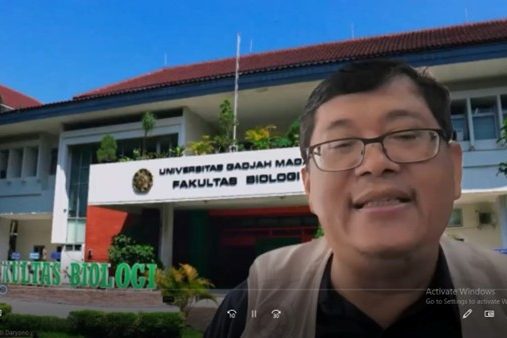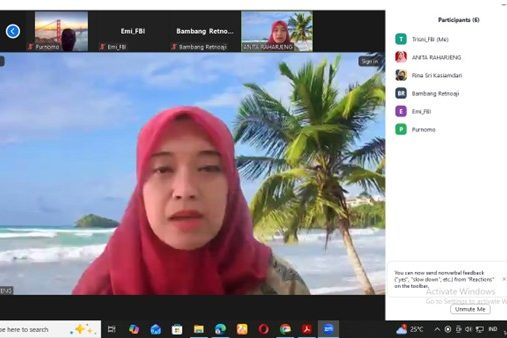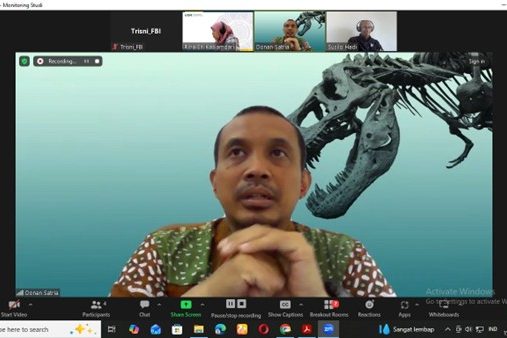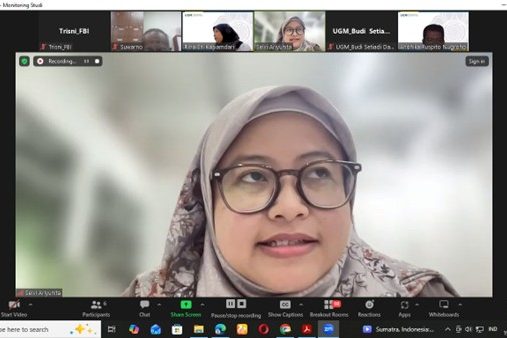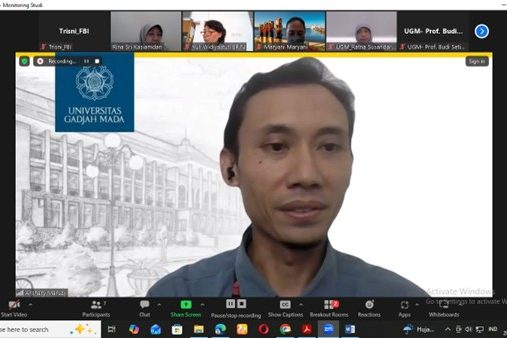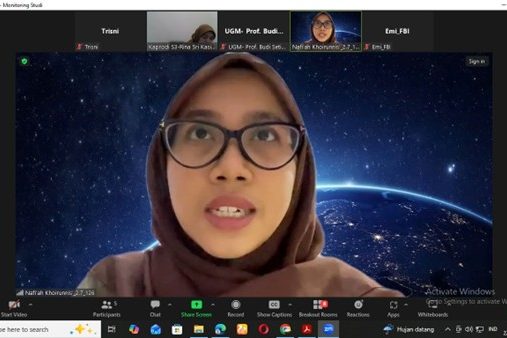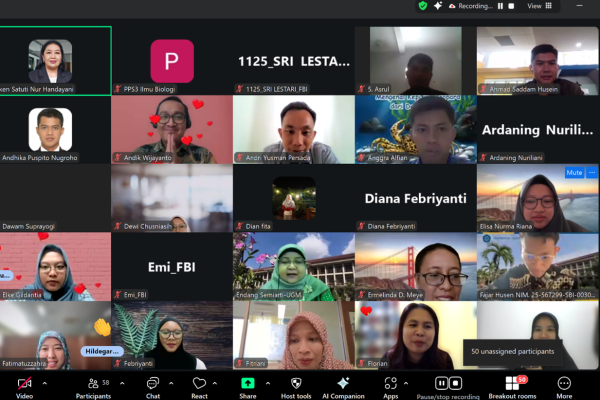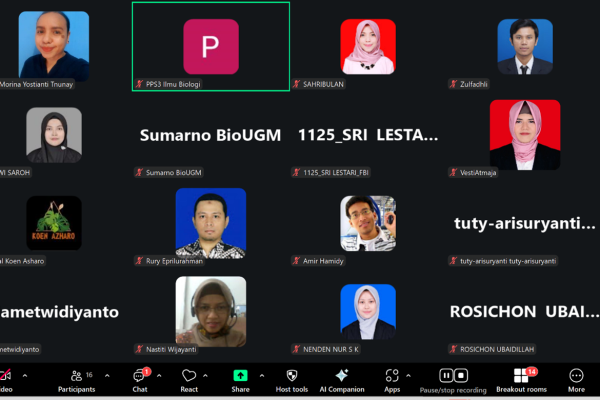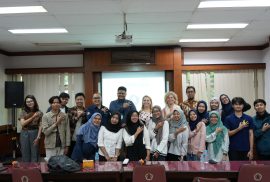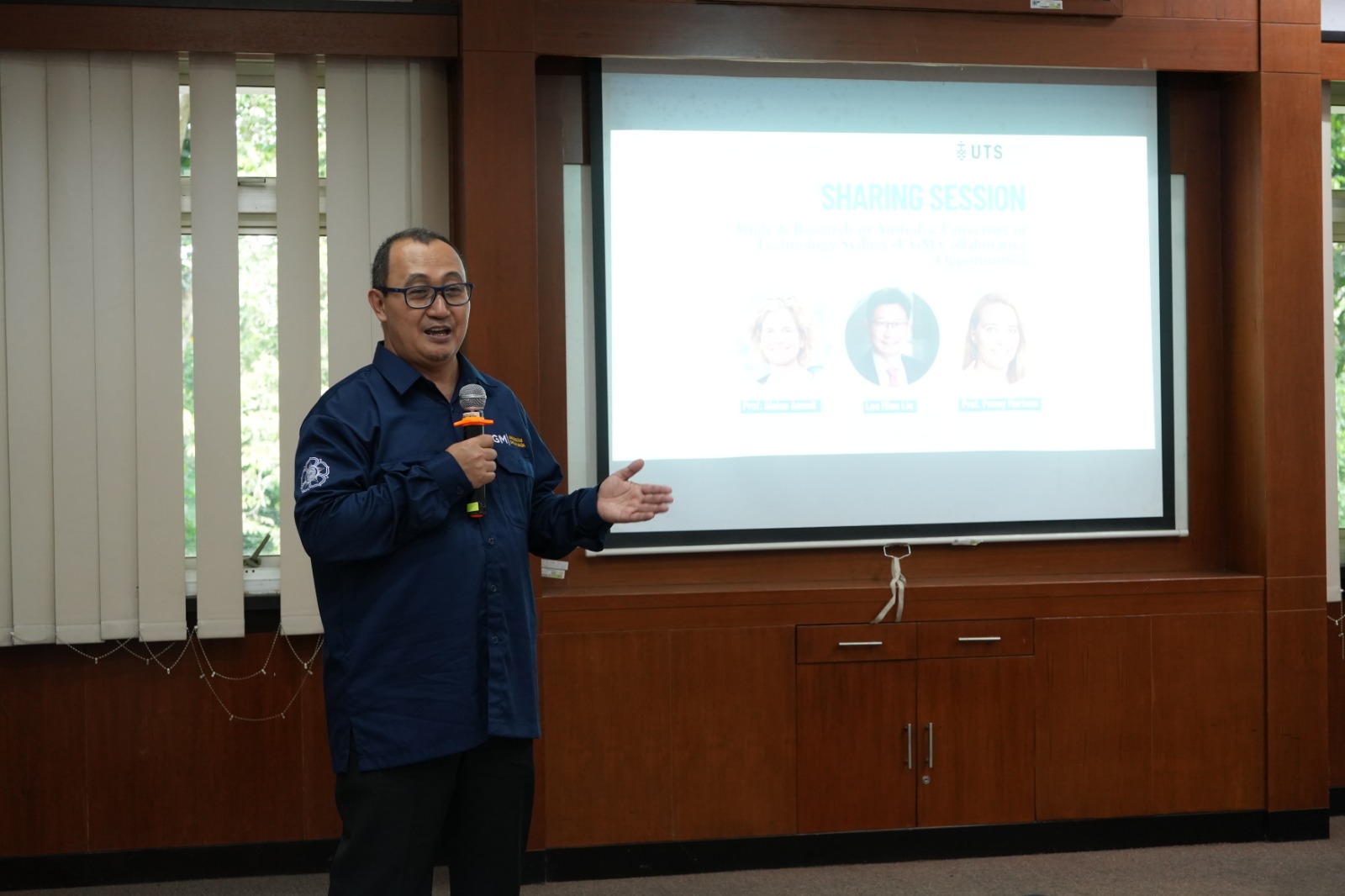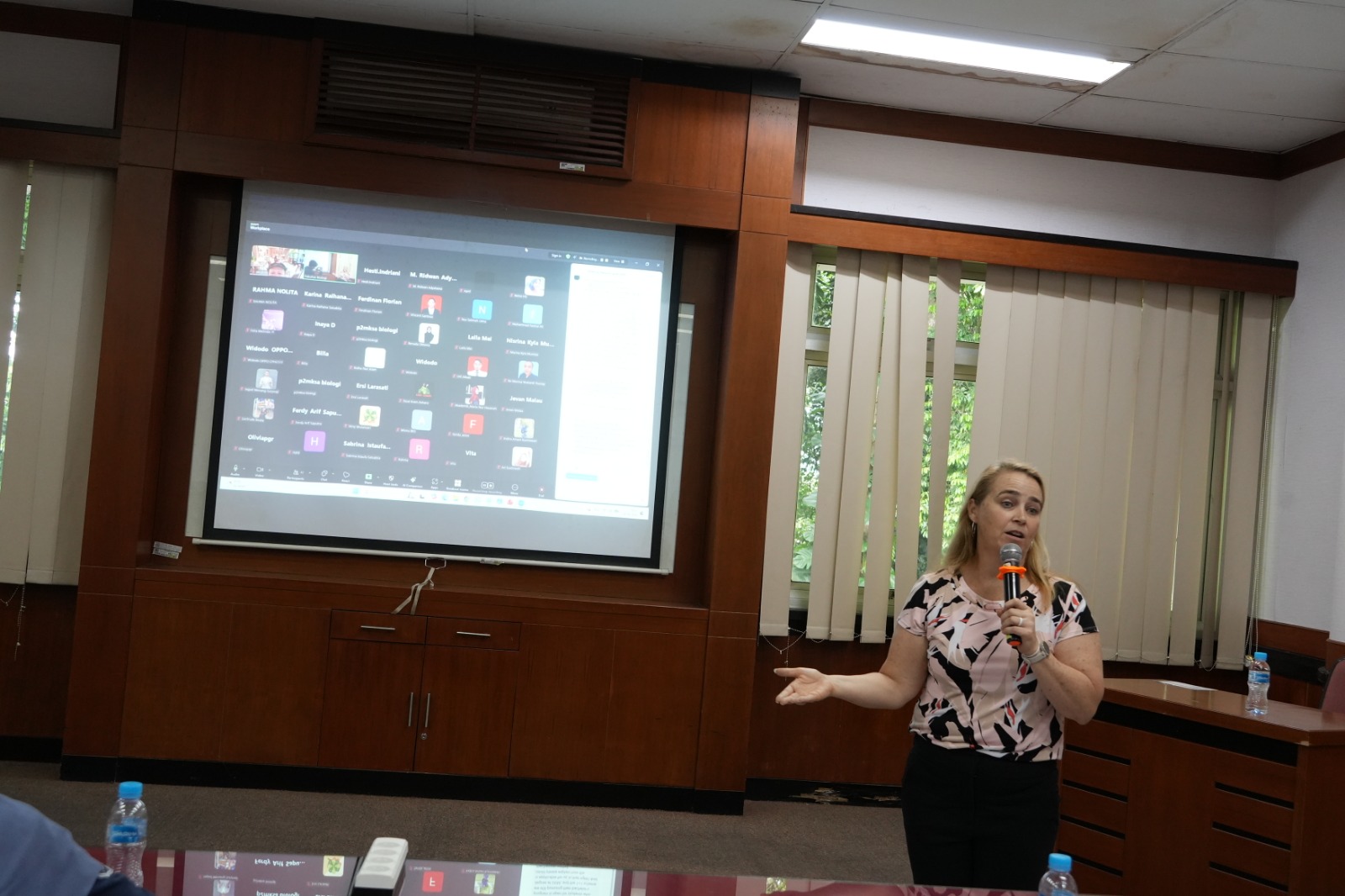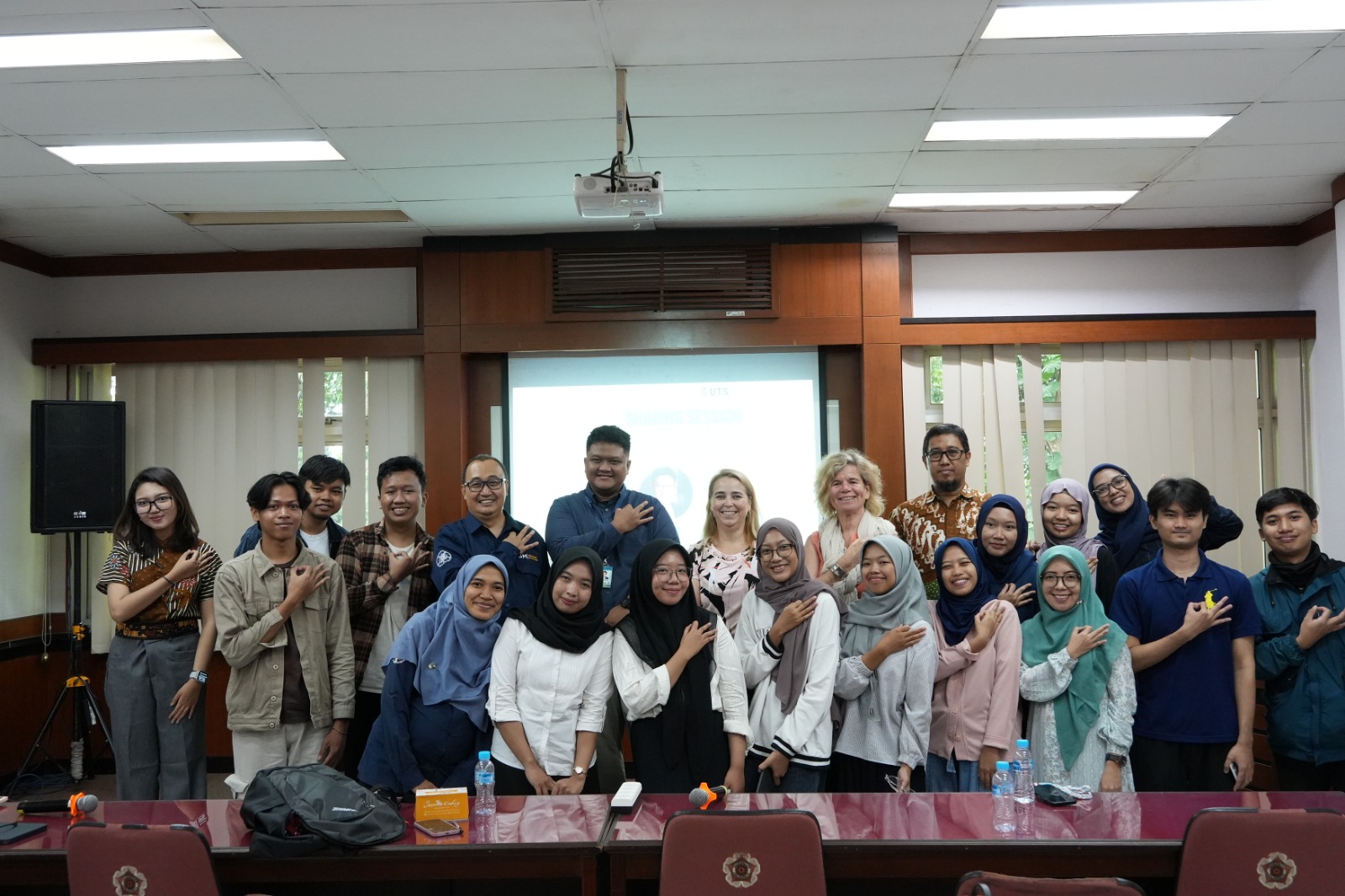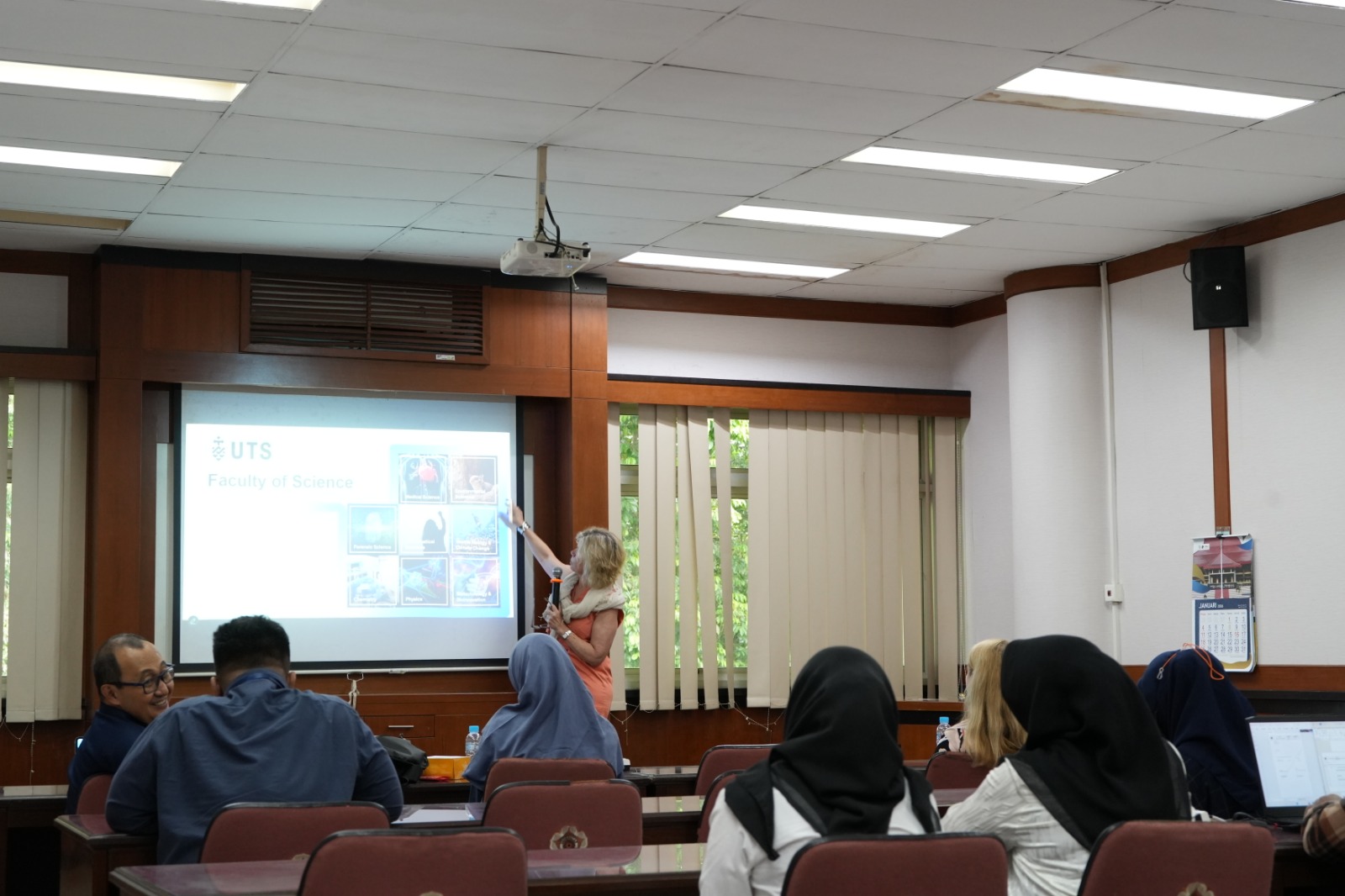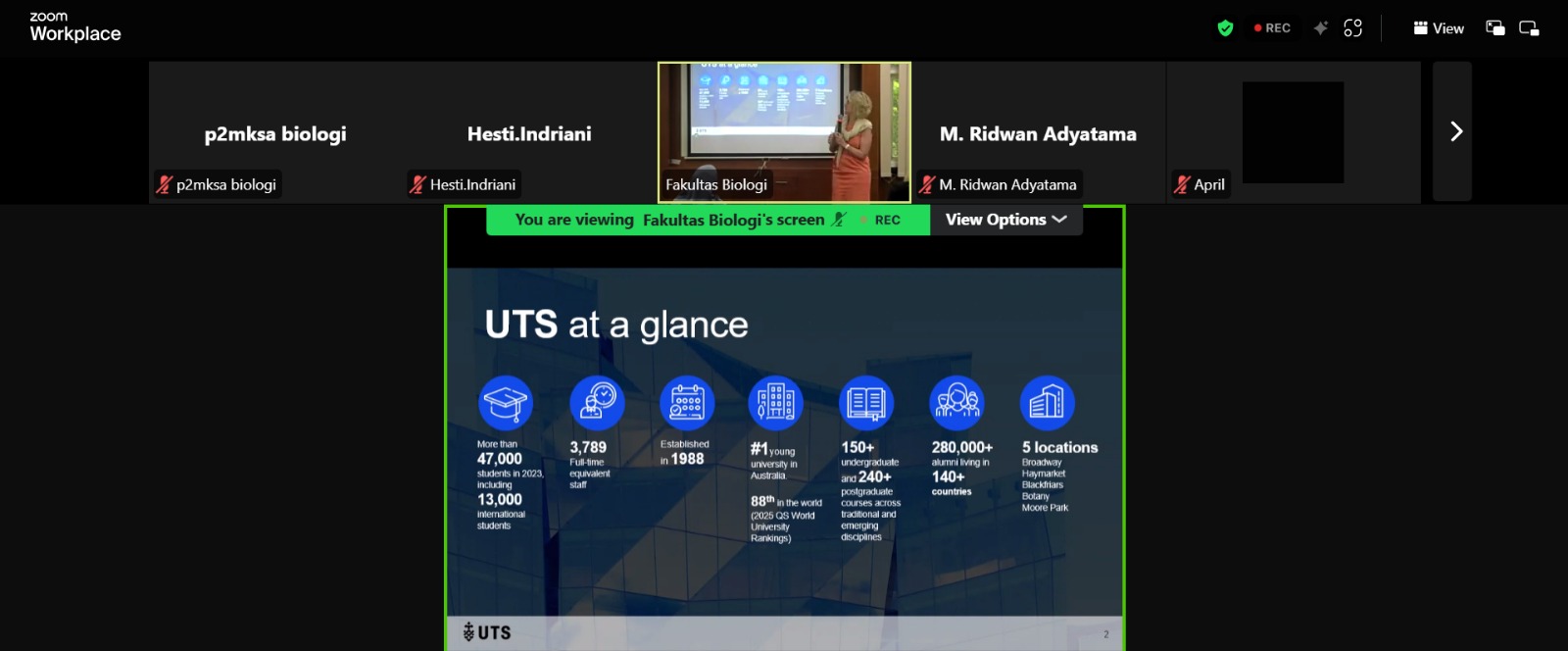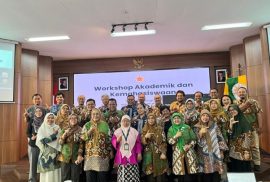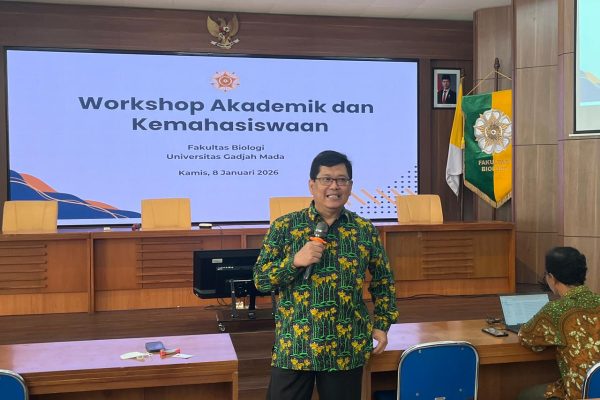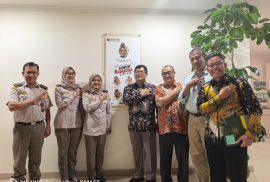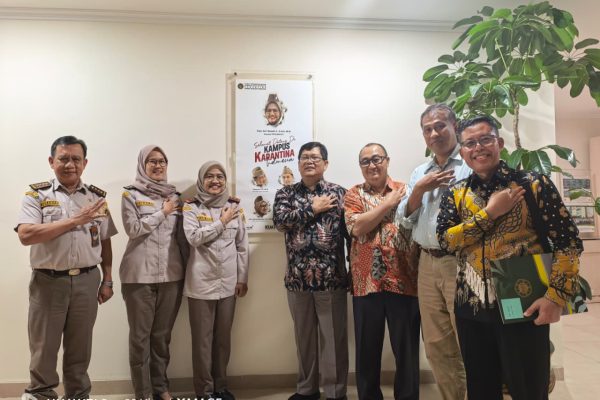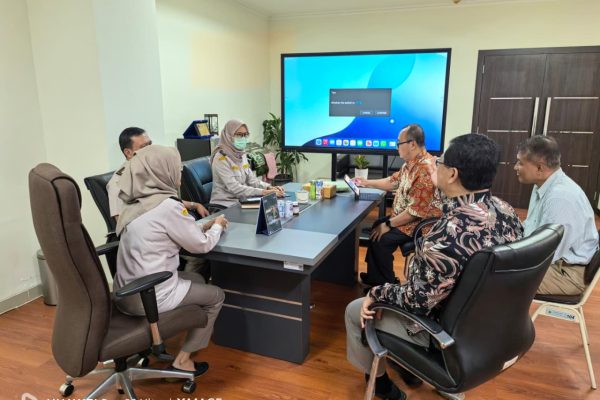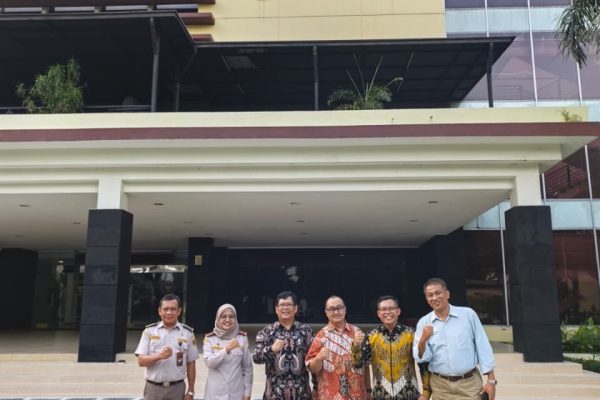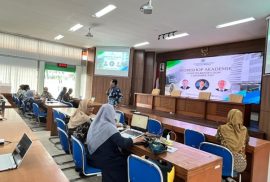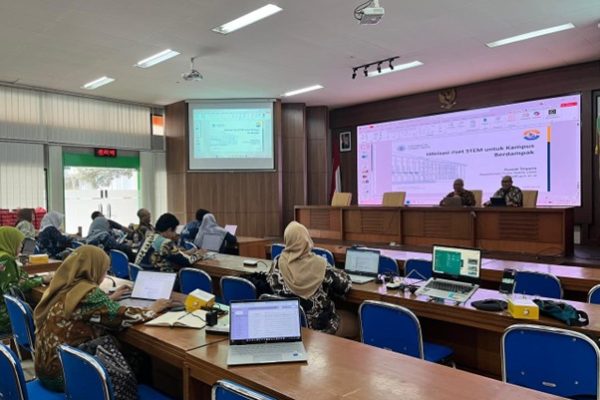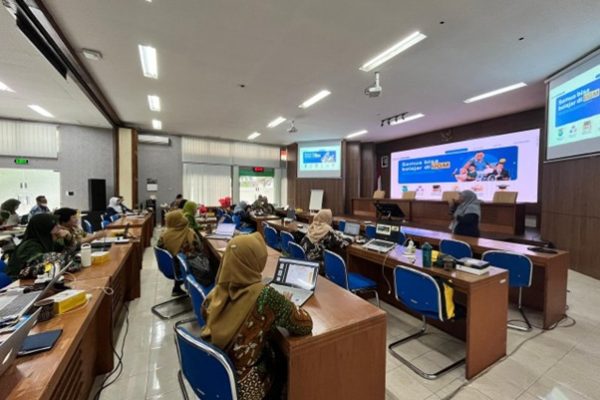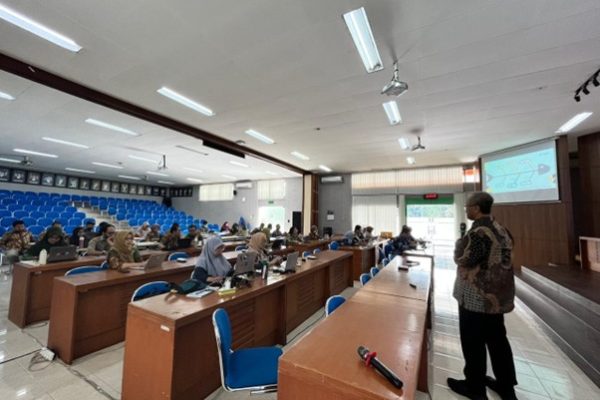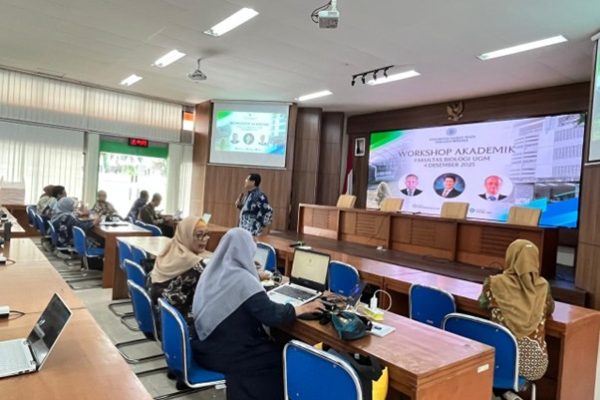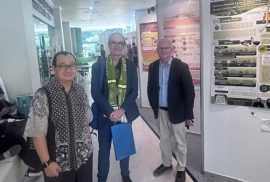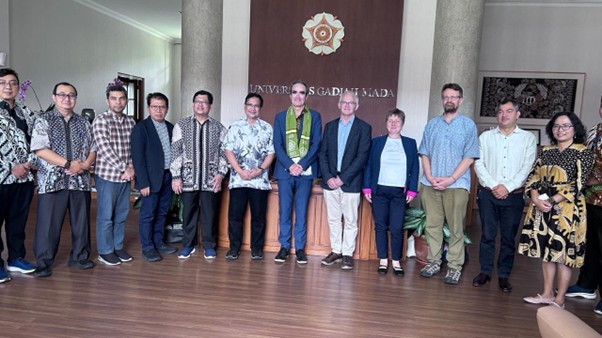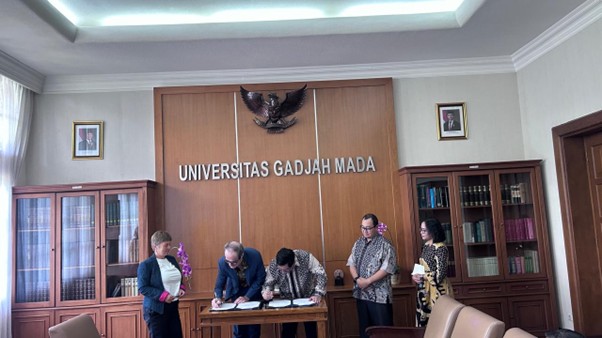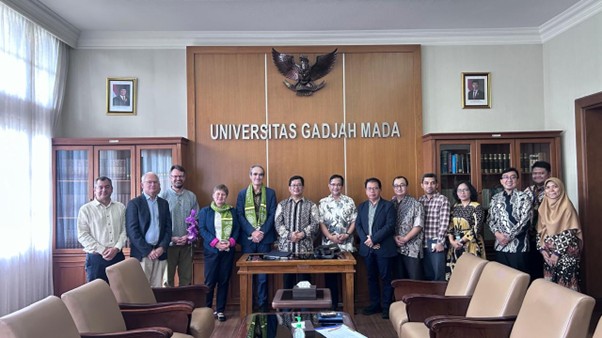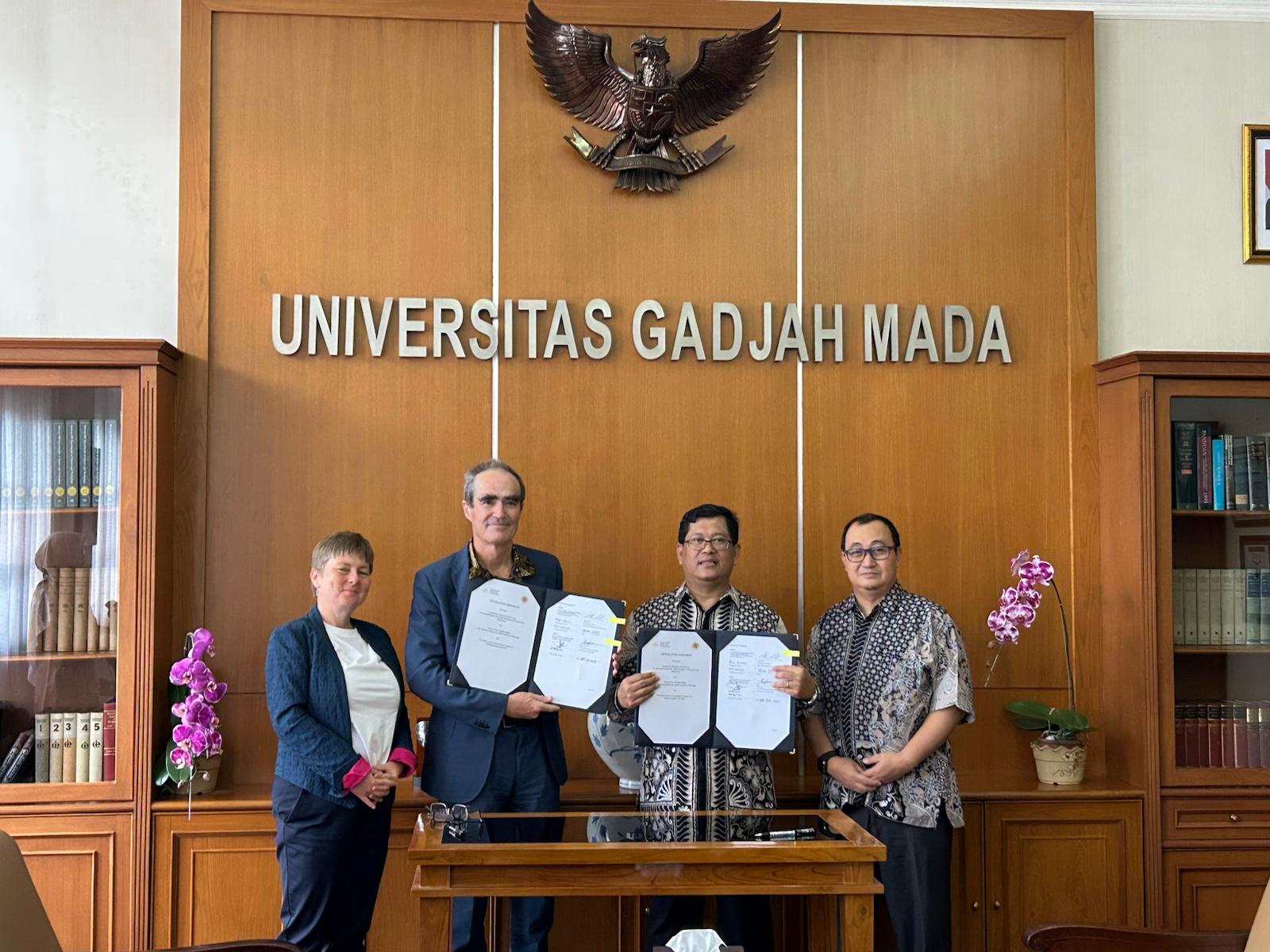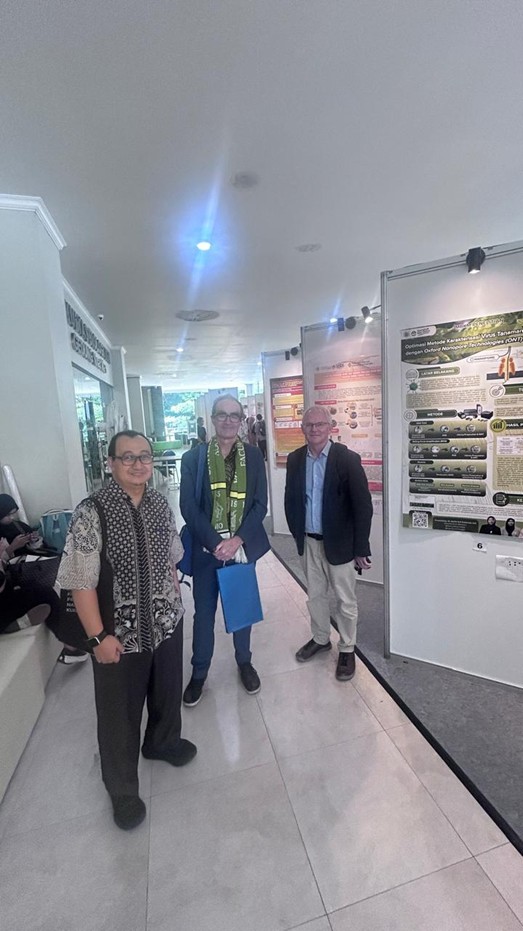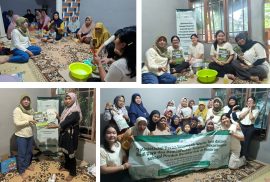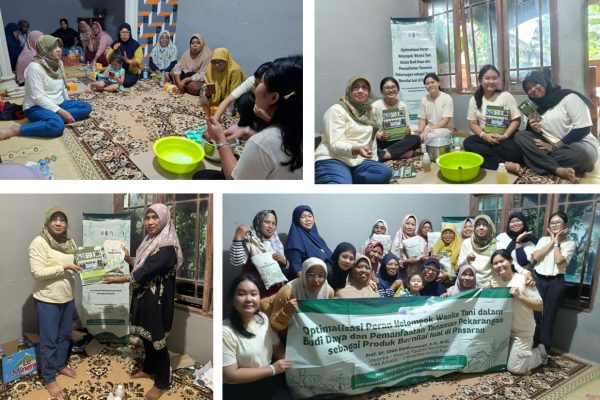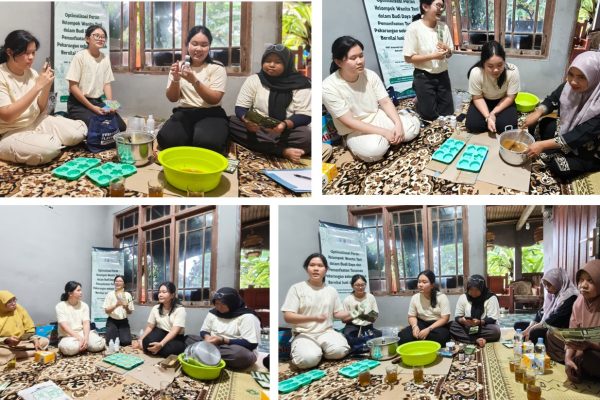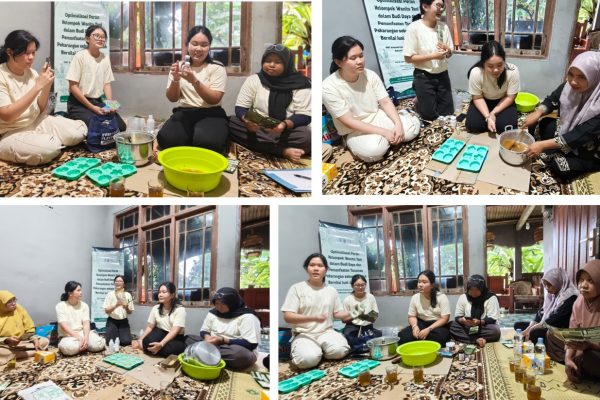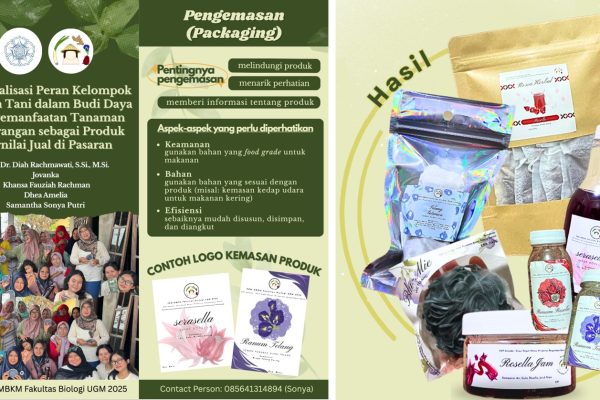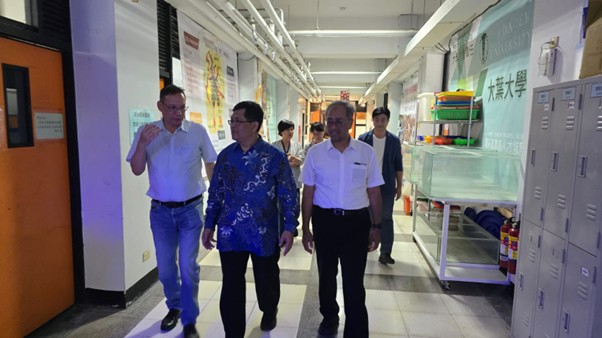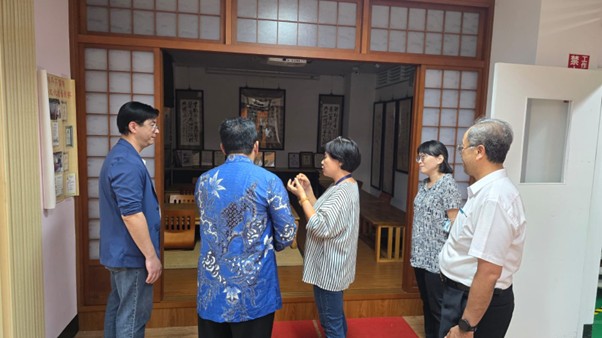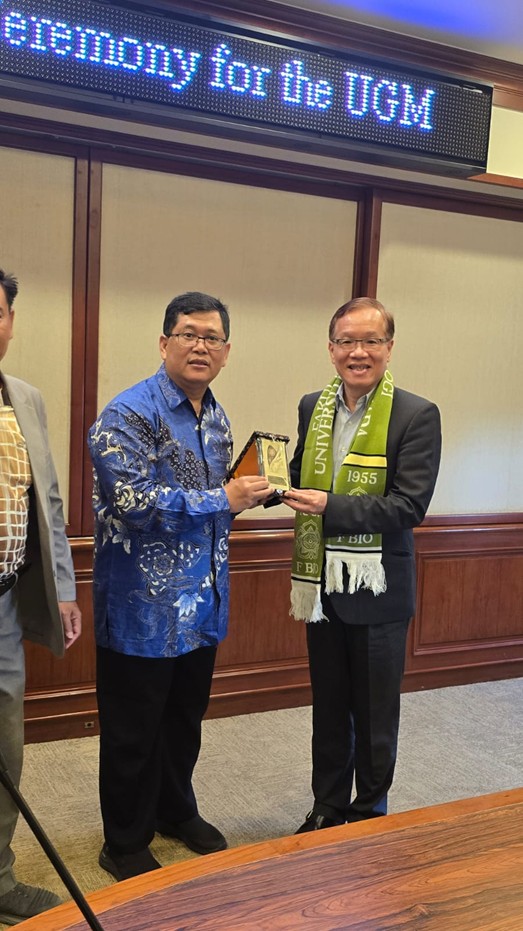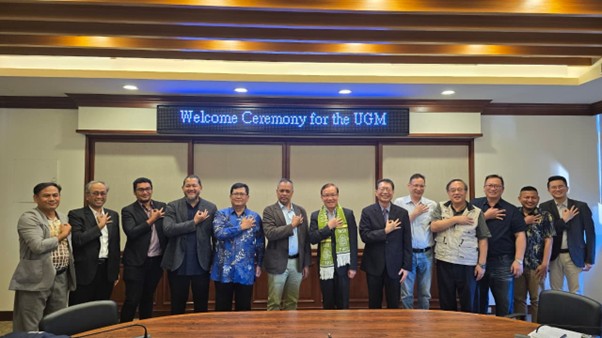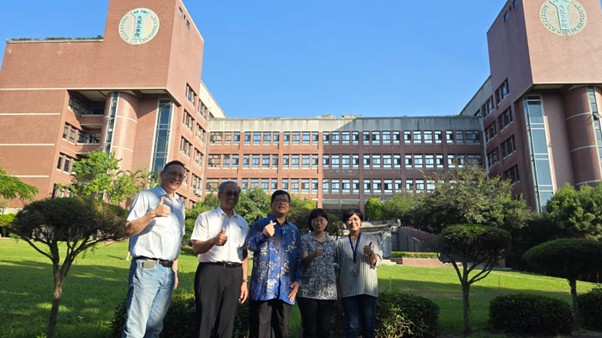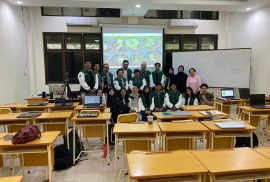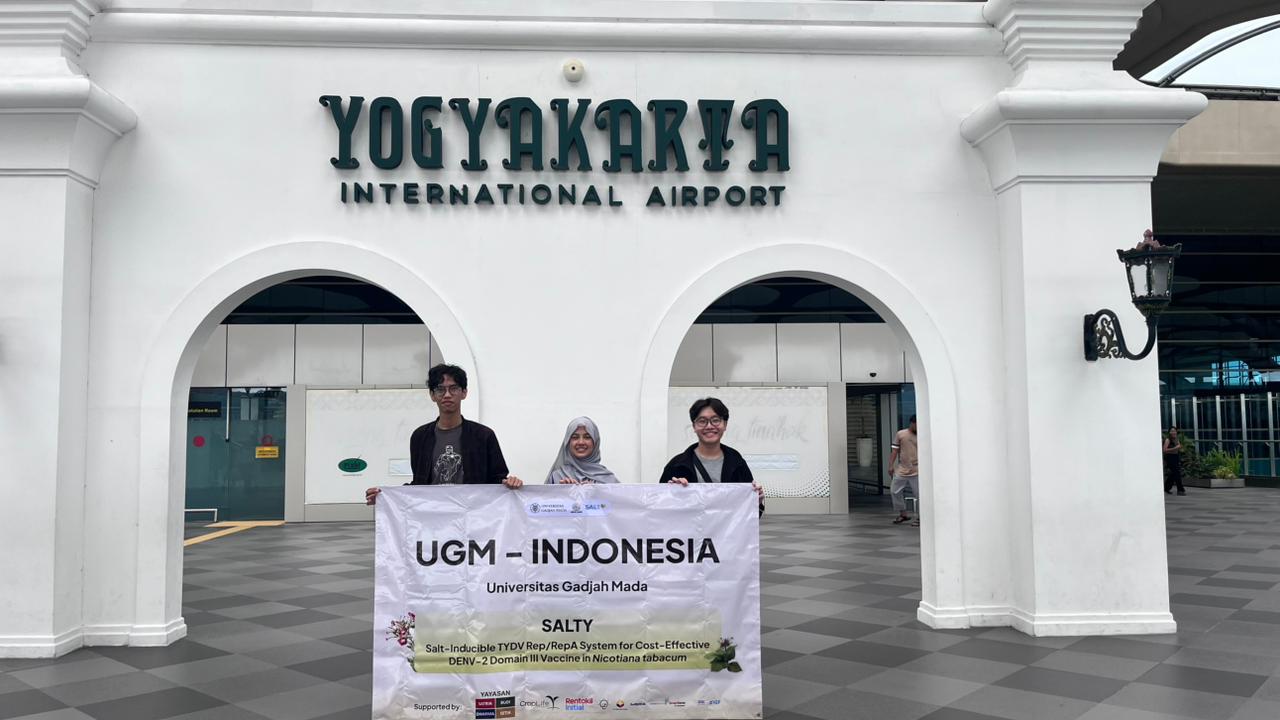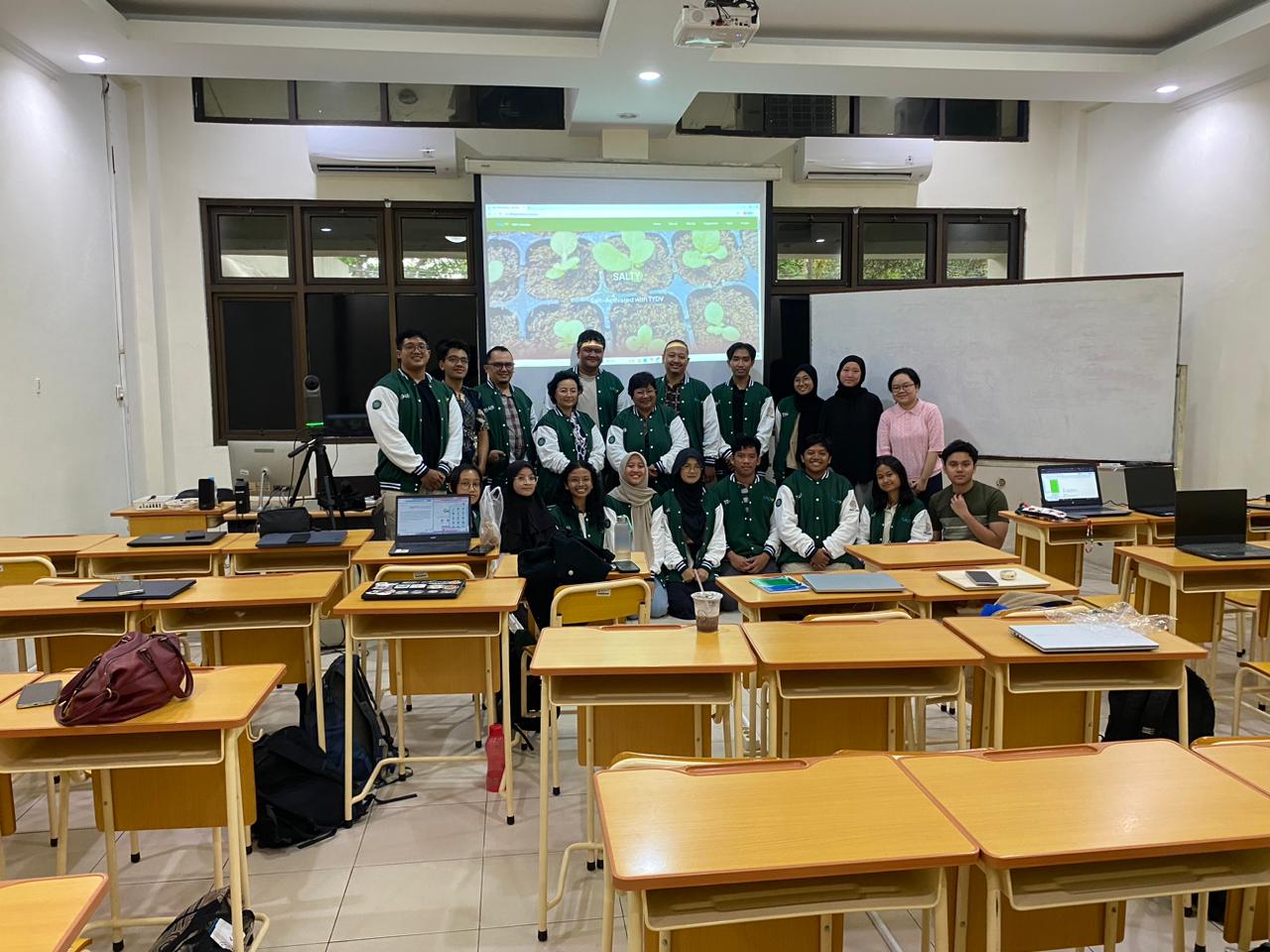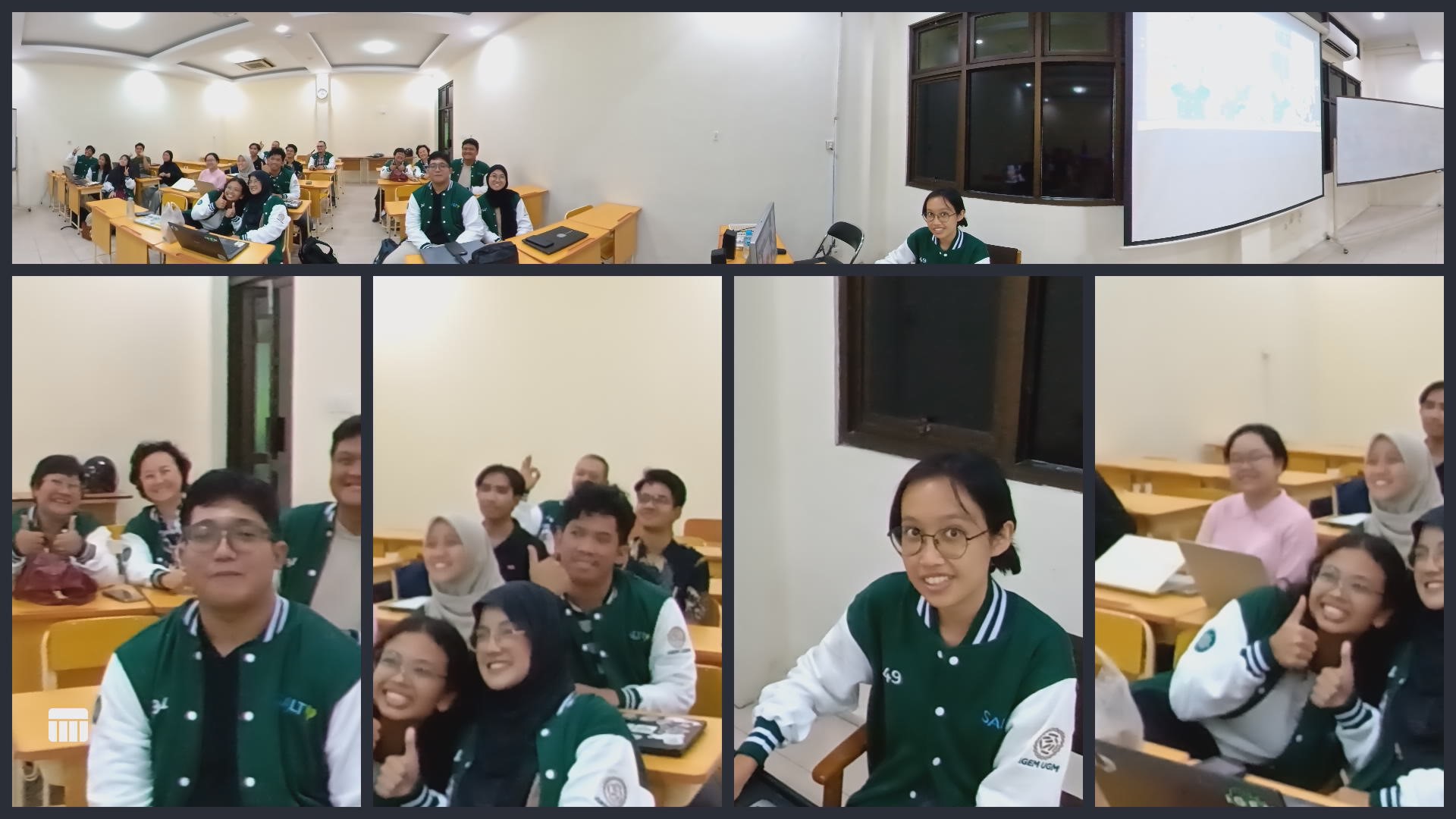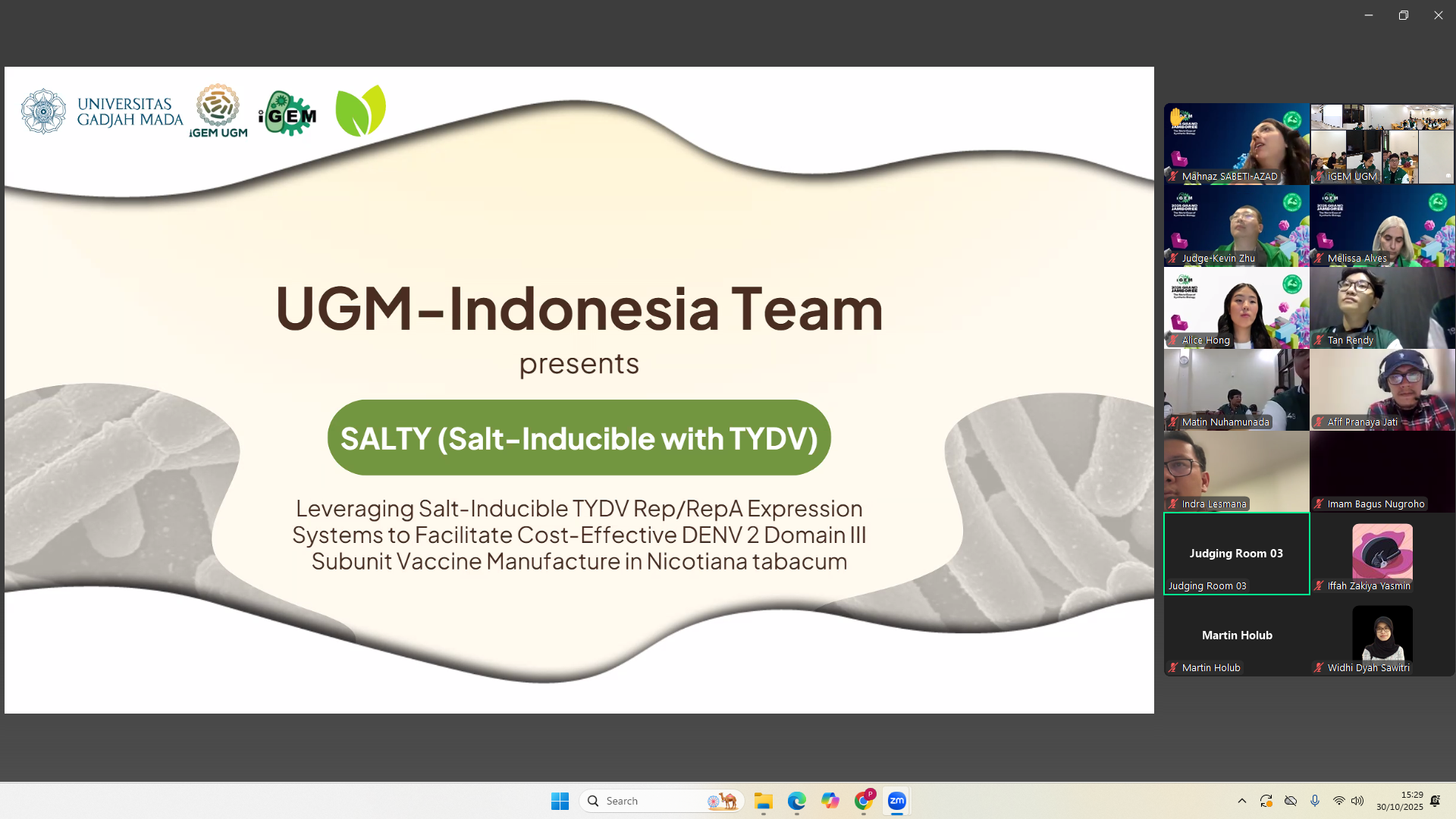Arsip:
SDG 9 : Increase Industry, Innovation, and Infrastructure
Yogyakarta, 14–22 January 2026, Over the course of a week, the Faculty of Biology at Universitas Gadjah Mada (UGM) conducted its Monitoring of Academic Progress for Doctoral Students in Biological Sciences, bringing together students from all doctoral cohorts as part of an ongoing evaluation of their academic progress.
A total of 136 doctoral students participated in the monitoring. The monitoring began on 14 January 2026 with 9 students from the 2019–2020 cohorts, followed by 10 students from the 2021 cohort on 15 January 2026. On 19 January 2026, 19 students from the 2022 cohort participated, followed by 28 students from the 2023 cohort on 20 January 2026. On Wednesday, 21 January 2026, the monitoring included 15 students from the 2024 cohort. On the final day, 22 January 2026, the sessions were attended by 15 students from the 2024 cohort and 39 students from the 2025 cohort. Monitoring for the 2025 cohort was carried out in group sessions, while students from the other cohorts participated in individual meetings with program management and their supervisory teams. In each session, students discussed the progress of their research, the challenges they had encountered, and the strategies they planned to overcome these obstacles. The sessions fostered open, meaningful dialogue, providing each student with guidance tailored to their individual needs.
The activity aimed to ensure that students’ academic progress aligns with university regulations, while also supporting timely completion of studies without compromising the quality of academic output and research. Beyond its evaluative purpose, the monitoring served as an academic dialogue to strengthen guidance and institutional support for doctoral students. During the sessions, the Dean of the Faculty of Biology, Prof. Dr. Budi Setiadi Daryono, M.Agr.Sc., emphasized that students must remain focused on prioritizing their studies, approach every stage of the academic process with full commitment and seriousness, and successfully complete their academic journey on time.
The program also reflects the Faculty of Biology UGM’s alignment with the Sustainable Development Goals (SDGs), particularly SDG 4 (Quality Education), SDG 9 (Industry, Innovation, and Infrastructure), and SDG 16 (Peace, Justice, and Strong Institutions), emphasizing responsible academic governance and excellence in research.
Yogyakarta, 21 January 2026 — The Faculty of Biology, Universitas Gadjah Mada (UGM), organized a Sharing Session on Study & Research in Australia: University of Technology Sydney–UGM Collaborative Opportunities on Wednesday (21/1). The event was conducted online and hosted at the Upper Meeting Room of the Faculty of Biology UGM, with participants consisting of lecturers and students from the Faculty of Biology as well as other faculties within UGM.
The session was officially opened by Prof. Dr. Eko Agus Suyono, M.App.Sc., Vice Dean for Research, Community Service, Collaboration, and Alumni of the Faculty of Biology UGM. In his opening remarks, he highlighted that the collaboration between UGM and the University of Technology Sydney (UTS) has been established for several years, encompassing research collaboration and academic cooperation such as international summer course funded by New Colombo Plan and double degree programs. He expressed his hope that this session would serve as a valuable opportunity for students to explore international academic and research pathways.
The main session was moderated by Matin Nuhamunada, Ph.D., a lecturer at the Faculty of Biology UGM. The sharing session featured two distinguished speakers from the University of Technology Sydney: Prof. Alaina Ammit, Associate Dean (Research), Faculty of Science, UTS, and Prof. Penny Martens, Pro Vice-Chancellor (Higher Degrees by Research), UTS.
In her presentation, Prof. Alaina Ammit introduced the University of Technology Sydney and its research facilities, with particular emphasis on the Faculty of Science. This was followed by a presentation from Prof. Penny Martens, who outlined academic programs, research collaboration opportunities, and scholarship schemes, including funding opportunities through the Indonesia Endowment Fund for Education (LPDP). Both speakers also introduced the expertise of UTS lecturers and researchers, highlighting potential areas for collaboration with UGM students and academics.
Through this sharing session, it is expected that the collaboration between UGM and UTS will be further strengthened, not only in the fields of education and research but also in the development of globally competitive human resources. This initiative supports the achievement of the Sustainable Development Goals (SDGs), particularly SDG 4 (Quality Education) by expanding access to high-quality international education, SDG 9 (Industry, Innovation, and Infrastructure) through strengthened research and innovation, and SDG 17 (Partnerships for the Goals) by fostering sustainable global partnerships.
Yogyakarta, 8 January 2026 — The Faculty of Biology, Universitas Gadjah Mada (UGM), held the Academic and Student Affairs Workshop 2026 at the Tropical Biology Auditorium, KPTU Building, 1st Floor. The workshop was attended by all academic staff of the Faculty of Biology UGM as part of continuous efforts to strengthen the quality of higher education in alignment with the Sustainable Development Goals (SDGs).
The workshop was officially opened by the Dean of the Faculty of Biology UGM, Prof. Dr. Budi Setiadi Daryono, M.Agr.Sc., who emphasized the importance of academic synergy in curriculum renewal, quality assurance, and the development of adaptive, inclusive, and sustainable learning systems. These efforts reflect the Faculty’s commitment to SDG 4 (Quality Education) through the provision of high-quality and relevant higher education.
In the main session, the Vice Dean for Academic and Student Affairs, Prof. Dr. Bambang Retnoaji, S.Si., M.Sc., presented the 2025 Academic and Student Affairs Key Performance Targets, focusing on the enhancement of learning outcomes, the strengthening of programme recognition, and the expansion of access to higher education. These initiatives contribute to SDG 4 and support innovation in academic governance in line with SDG 9 (Industry, Innovation, and Infrastructure).
The workshop also featured a refreshing session on the Outcome-Based Assessment Information System (SIOBA) delivered by Zuliyati Rohmah, S.Si., M.Si., Ph.D.Eng., aimed at reinforcing the implementation of Outcome-Based Education (OBE). The OBE approach supports accountability, transparency, and continuous quality improvement in higher education, further advancing the Faculty’s contribution to SDG 4.
Subsequently, the workshop focused on monitoring, evaluation, and preparation for the upcoming semester across all academic levels. The undergraduate programme was presented by Sukirno, S.Si., M.Sc., Ph.D., followed by the master’s programme by Prof. Dr. Diah Rachmawati, S.Si., M.Sc., the professional programme by Prof. Dra. Tuty Arisuryanti, M.Sc., Ph.D., and the doctoral programme by Prof. Rina Sri Kasiamdari, S.Si., Ph.D. This cross-level academic discussion reflects strengthened internal collaboration and supports SDG 17 (Partnerships for the Goals).
Through this workshop, the Faculty of Biology UGM reaffirms its commitment to continuous academic improvement and to making meaningful contributions to the achievement of SDG 4 (Quality Education), SDG 9 (Industry, Innovation, and Infrastructure), and SDG 17 (Partnerships for the Goals) at both national and global levels.
Yogyakarta, 6 January 2026 — The Faculty of Biology, Universitas Gadjah Mada (UGM), conducted an official visit to the Indonesian Quarantine Agency (Badan Karantina Indonesia) as part of efforts to strengthen institutional synergy in supporting the protection of national biodiversity. The visit served as a strategic forum to discuss the alignment of the Faculty of Biology UGM’s academic programs with the duties and functions of the Indonesian Quarantine Agency.
The UGM delegation was led by Prof. Dr. Budi Setiadi Daryono, Dean of the Faculty of Biology, accompanied by Dr. Eko Agus Suyono, M.App.Sc., Vice Dean for Research, Community Service, Cooperation, and Alumni, and Dr. Slamet Widiyanto, M.Sc., Vice Dean for Finance, Assets, and Human Resources of the Faculty of Biology UGM.
The visit was received by Dian Seri Rezeki Kusumastuti, S.Hut., M.Si., Head of the Center for Human Resource Development for Animal, Fish, and Plant Quarantine; Yokanan, S.Pi., M.Si., Deputy for Fish Quarantine; as well as drh. Esmiralda Eka Fitri, M.Si., Functional Officer of Veterinary Quarantine at the Indonesian Quarantine Agency.
During the meeting, discussions focused on several flagship academic programs of the Faculty of Biology UGM that are highly relevant to the mandate and operational needs of the Indonesian Quarantine Agency, particularly the Professional Program for Biodiversity Curators (PKKH), as well as the Master’s and Doctoral Programs. These programs were recognized for their strong potential in supporting human resource capacity building and strengthening the scientific foundation of quarantine activities.
The meeting also highlighted opportunities for collaboration in genomic analysis through the Integrated Genome Factory (IGF) facility at the Faculty of Biology UGM. The utilization of IGF is expected to support quarantine operations, particularly in organism identification, early detection of invasive species, and science- and technology-based protection of national biodiversity.
Through this exploratory collaboration, the Faculty of Biology UGM and the Indonesian Quarantine Agency reaffirm their commitment to strengthening sustainable partnerships. This initiative aligns with the achievement of the Sustainable Development Goals (SDGs), particularly SDG 4 (Quality Education), SDG 9 (Industry, Innovation, and Infrastructure), SDG 15 (Life on Land), and SDG 17 (Partnerships for the Goals).
Yogyakarta, 4 December 2025 , The Faculty of Biology, Universitas Gadjah Mada (UGM), organized the Academic Workshop 2025, at the Tropical Biology Auditorium, Faculty of Biology UGM. The workshop served as a strategic platform to strengthen academic governance, enhance the quality of teaching and learning, and promote research commercialization in line with societal needs and the Sustainable Development Goals (SDGs)
The workshop was officially opened by the Dean of the Faculty of Biology UGM, Prof. Dr. Budi Setiadi Daryono, M.Agr.Sc., who highlighted the importance of a shared institutional commitment to maintaining high-quality academic services and fostering learning innovations that address both national and global challenges
The agenda continued with a presentation by the Vice Dean for Academic Affairs and Student Affairs, Prof. Dr. Bambang Retnoaji, M.Sc., who presented updates on academic regulations covering curriculum development, learning evaluation mechanisms, and academic service standards. These updates aim to strengthen a transparent, inclusive, and quality-oriented academic culture
The next session was delivered by Zuliyati Rohmah, S.Si., M.Si., Ph.D.Eng., who presented the implementation of Massive Open Online Courses (MOOCs) and Outcome-Based Education (OBE). The session also addressed the systematic revision and standardization of course modules, course syllabi (RPS), and course portfolios for the Study Programme of Bachelor in Biology, Study Programme of Master in Biology, Professional Study Program in Biodiversity Curation, and Study Program of Doctor in Biological Sciences. These efforts aim to ensure alignment between learning outcomes, teaching and learning activities, and assessment methods, while supporting equitable access to quality education (SDG 4)
The workshop concluded with a sharing session by Prof. Dr. Eng. Kuwat Triyana, M.Si., Dean of the Faculty of Mathematics and Natural Sciences (FMIPA) UGM. He emphasized the strategic importance of research commercialization in STEM disciplines and the role of interdisciplinary collaboration in generating innovations with sustainable economic, social, and environmental impact (SDG 9 and SDG 17)
Overall, the Academic Workshop 2025 provided valuable insights into the academic development priorities of the Faculty of Biology UGM, strengthened the institution’s contribution to the SDGs, and reaffirmed a collective commitment to delivering biological education that is excellent, innovative, and globally competitive
Yogyakarta, 28 November 2025 — Universitas Gadjah Mada (UGM) welcomed a delegation from the Australian National University (ANU), Australia, to discuss the extension of the undergraduate Double Degree program with the Faculty of Biology and explore broader prospects for strategic collaboration with the university. The meeting took place in the Meeting Room of the Rector’s Office at UGM. The ANU delegation was led by Professor Kiaran Kirk, Dean of the College of Science and Medicine, accompanied by Professor Stephen Eggins, Dean of the College of Systems and Society; Professor Maja Adamska, Associate Director of Education at the College of Science and Medicine, Research School of Biology; Associate Professor Jeremy Smith from the College of Systems & Society, School of Engineering; and Leonardo Alfonzo, Regional Manager for International Relations and Partnerships – STEMM.
From UGM, the meeting was attended by Prof. Dr. Puji Astuti, S.Si., M.Sc., Apt., Director of Partnerships, Alumni, and International Affairs of UGM, accompanied by Tyas Iksan Hikmawan, Ph.D., Head of the Office of International Affairs (KUI) UGM. Also present were Prof. Dr. Budi Setiadi Daryono, M.Agr.Sc., Dean of the Faculty of Biology; Dr. Eko Agus Suyono, M.App.Sc., Vice Dean for Research, Community Service, Collaboration, and Alumni; Nur Indah Septriani, Ph.D., Head of the International Affairs Office of the Faculty of Biology; and Matin Nuhamunada, Ph.D., Secretary of the Biology International Affairs Office. In addition, the meeting was attended by Prof. dr. Yodi Mahendradhata, M.Sc., Ph.D., FRSPH, Dean of the Faculty of Medicine, Public Health, and Nursing; Prof. Dr.-Ing. Ir. Agus Maryono, IPM, ASEAN Eng., Dean of the Vocational College; and Prof. Ir. Ali Awaludin, S.T., M.Eng., Ph.D., IPU, ACPE, Vice Dean for Research, Community Service, and Collaboration of the Faculty of Engineering.
Opening the discussion, Prof. Puji Astuti expressed her warm welcome and appreciation for the longstanding partnership between UGM and ANU, highlighting the strong foundation of collaboration that has been built over the years. The meeting continued with discussions on strengthening and expanding the partnership through initiatives such as the Enhancing Quality Education for International University Impacts and Recognition (EQUITY WCU) program, the New Colombo Plan, and academic collaboration schemes with potential support from the Indonesia Endowment Fund for Education (LPDP).
A major highlight of the meeting was the signing of the extension of the Double Degree Undergraduate Program between the Faculty of Biology UGM and the College of Science and Medicine ANU. The collaboration, which has been running since 2018, has been reaffirmed following the graduation of the program’s first two participants, Vanessa and Sabut, who successfully completed their studies at both UGM and ANU in 2025. On this occasion, Prof. Budi emphasized that the continuation of this program represents a strategic opportunity for UGM to broaden global academic exposure for students while enhancing their competencies through high-quality international learning experiences.
Beyond the undergraduate collaboration, discussions also explored the potential for multidisciplinary research partnerships involving the Faculty of Biology, the Faculty of Medicine, Public Health, and Nursing, the Faculty of Engineering, and the Vocational College. Both institutions exchanged ideas on potential research topics that could be developed collaboratively, including biology, public health, systems engineering, and technological innovations supporting sustainable development.
The agenda proceeded with a Faculty Tour to the Faculty of Biology UGM, specifically to the ongoing Research Day activities. The ANU delegation was introduced to various research initiatives, academic activities, and established collaborations within the faculty.
Concluding the visit, UGM and ANU expressed their shared hope that the strengthened partnership will not only advance academic excellence but also generate real contributions to society through alignment with the Sustainable Development Goals (SDGs). The collaboration supports SDG 4 on quality education through international mobility and capacity building, SDG 9 on innovation and impactful research, and SDG 17 on strengthening global partnerships. Moving forward, both institutions expect this cooperation to evolve into a model of international academic partnership that drives innovation, enhances human resource capacity, and reinforces the essential role of higher education institutions in addressing global challenges.
The 2025 PkM-MBKM Team, led by Prof. Dr. Diah Rachmawati, S.Si., M.Si. with members Jovanka, Khansa Fauziah Rachman, Samantha Sonya Putri, and Dhea Amelia, conducted a practical workshop on herbal soap production as well as product packaging and marketing for the Women Farmers Group (KWT) Amanda on Sunday, 16 November 2025, in Padukuhan Kepuh Wetan, Wirokerten Village, Banguntapan Subdistrict, Bantul Regency, Special Region of Yogyakarta. During the program, members of KWT Amanda received hands-on guidance on utilizing home-garden commodities into marketable products. The training focused on two main topics: the practice of herbal soap making and the packaging and marketing of processed products made from butterfly pea, roselle, ginger, and lemongrass. Packaging and marketing strategies are essential aspects of increasing the added value of a product, especially for home-based business groups such as KWT. Proper packaging not only functions to protect the product but also serves as a medium for information, brand identity, and visual appeal that influences consumer purchasing decisions. Meanwhile, appropriate marketing strategies whether through direct selling or the use of digital platforms can broaden market reach, improve the competitiveness of local products, and support small-scale entrepreneurs in building sustainable economic growth.
The activity began with an explanation of the herbal soap-making process, starting from the introduction of safe natural ingredients, composition comparisons, mixing techniques, and the soap molding stage. Members of KWT Amanda were also informed about the function of each ingredient, potential variations in shape and scent, as well as product safety standards to ensure consistent production. After the presentation, participants engaged in hands-on soap-making practice under the guidance of the team. The next session focused on packaging and marketing strategies for processed products made from butterfly pea, roselle, ginger, and lemongrass. The team delivered materials on basic principles of packaging design, the importance of product identity (branding), and how to create attractive and informative labels. In addition, KWT members received training on marketing local products through various channels, both direct selling and digital platforms, to strengthen the competitiveness of the products they produce.
Members of KWT actively participate in practicing making herbal soap and discussing how to independently market herbal products. Their active participation indicates that the skills provided were relevant and applicable to the development of household-scale businesses. This program is expected to enhance the utilization of home-garden resources, strengthen food resilience and independence (SDG 2), promote the use of natural and health-supporting materials (SDG 3), create opportunities for small-scale enterprises based on local potential (SDG 9), and reinforce partnerships between universities and communities (SDG 17).
Changhua, Taiwan, November 6, 2025 — As part of its ongoing commitment to strengthening global engagement and enhancing academic excellence, the Faculty of Biology, Universitas Gadjah Mada (UGM), conducted an official visit to DaYeh University, located at No.168, University Rd., Dacun, Changhua 515006, Taiwan (R.O.C.). The visit aimed to broaden international collaboration in education, research, and student mobility through various strategic programs.
The delegation from the Faculty of Biology UGM was led by Prof. Dr. Budi Setiadi Daryono, M.Agr.Sc., Dean of the Faculty of Biology, accompanied by Prof. Dr. Bambang Retnoaji, M.Sc., Vice Dean for Academic and Student Affairs. The delegation also included representatives from other faculties: Prof. Roto, Ph.D., Vice Dean for Academic and Student Affairs of the Faculty of Mathematics and Natural Sciences (MIPA); Dr. Erliss Sulistyarini, Vice Dean for Academic and Student Affairs of the Faculty of Geography; Dr. Andung Bayu Sekti; and Arif Misbahul, Director of the Taiwan Center UGM.
DaYeh University was represented by several university leaders, including Prof. Dr.-Ing. Shih-Jen Yeh, Vice President of DaYeh University; Prof. Yi-Ching Chen, Ph.D., Department of Engineering; Prof. Yi-Lin Chen, Ph.D., Department of Environmental and Safety Engineering; Prof. Daniel Yuen-The Liu, Vice Dean, Office of Foreign Affairs; and Asst. Prof. Wen-Kuang Hsu, Ph.D., Department of Medicinal Botanical and Food on Health Applications.
The meeting began with institutional profile presentations from both universities. In his presentation, Prof. Budi Setiadi Daryono highlighted the achievements and vision of the Faculty of Biology UGM in tropical biology research and education, as well as potential areas of collaboration in biodiversity, conservation, biotechnology, and biomedicine. The main discussion focused on developing joint programs such as Double Degree, Student Exchange, Co-supervision, and Fast Track schemes, followed by a tour of Dayeh University’s laboratory facilities. Both institutions also explored potential collaborative research in biomedical sciences—particularly studies on lung and ovarian cancer—as well as research in food and nutritional sciences and environmental sciences. Further discussions included projects involving zebrafish as a model organism and the development of plant tissue culture for various commodities such as roses, strawberries, and bananas.
As part of the collaboration initiative, DaYeh University offered scholarship opportunities for up to 20 students from the Faculty of Biology UGM to participate in Double Degree programs in biomedical and environmental sciences. This program provides students with valuable international academic experience and the opportunity to build professional networks in Taiwan.
This visit marks a strategic step for the Faculty of Biology UGM in expanding international partnerships, strengthening collaborative research capacity, and supporting the university’s mission of advancing higher education internationalization and global competitiveness. The initiative also aligns with the Faculty’s commitment to the United Nations Sustainable Development Goals (SDGs), particularly SDG 4 (Quality Education), SDG 9 (Industry, Innovation, and Infrastructure), SDG 15 (Life on Land), and SDG 17 (Partnerships for the Goals), through efforts to enhance the quality of biological education, promote innovative cross-disciplinary research, foster global collaboration, and contribute to biodiversity conservation and sustainable scientific development.
Yogyakarta, Indonesia — The International Genetically Engineered Machine (iGEM) UGM 2025Team represents Universitas Gadjah Mada in the annual international synthetic biologycompetition held in Paris, France. The UGM iGEM Team was first established in 2021 and hascontinued to grow ever since. In 2025, the team is were supported by Anandita Amalia (Biology),Salma Rohmaniah (Biology), Erwinda Dwi Chofifah (Biology), Tsaqifa Zuhayra Emery Bagus(Biology), Nauval Rajwaa Raysendria (Biology), Geraldine Yara Amritarashmi (Biology), TanRendy (Biology), Shainna Nur Sharfina (Biology), and Pamastadewi Pryankha Hijrianto(Biology) in collaboration with 11 other people from faculty of Medicine, Faculty of Pharmacy,Faculty of Biology, Faculty of Mathematics and Natural Science, and Faculty of Agriculture.
Despite their impressive gold medal win at the iGEM Grand Jamboree 2025, the team’s journeyhas been long and full of milestones since 2024. That year, the UGM iGEM Team participated inthe Bioinformatics and Synthetic Biology Competition (BIOS) 2024, organized by synbio.id.They entered two sub-teams — Team Phytovac and Team Gamanthrax — both of whichachieved remarkable success. Team Phytovac won Best Presentation, Best Website, and theGrand Prize Winner, while Team Gamanthrax earned the Best Poster award. Both teams proudlybrought home gold medals, reflecting their dedication, teamwork, and perseverance.
Not stopping at the national level, the UGM iGEM Team also competed in the Global OpenGenetic Engineering Competition (GOGEC) 2025, an international synthetic biologycompetition. At GOGEC, the team won several distinctions, including Runner-Up for BestWritten Communication and Best Project Value, and took home the title of Best ComputationalProject.
Their molecular farming research to produce a Dengue vaccine was thoroughly documented andtransformed into a science dissemination video, earning the team a digital learning contentdevelopment grant in 2025. The proposed video, titled “Tobacco, the Heritage of theArchipelago: From Cultural Rituals to Dengue Vaccine Innovation”, was led by apt. SetyowatiTriastuti Utami, Ph.D. from the Faculty of Pharmacy, Universitas Gadjah Mada.
With all the achievements they’ve accomplished, the UGM iGEM 2025 Team stands as a symbolof passion and creativity in advancing synthetic biology. The team hopes that their innovationscan be applied widely and inclusively across Indonesia, creating a meaningful impact andcontributing to the advancement of science and prosperity of Indonesia.
Yogyakarta, Indonesia — The UGM-Indonesia iGEM 2025 team announced it has won a GoldMedal in the Biomanufacturing Village at iGEM Grand Jamboree held at the Paris ConventionCentre (Porte de Versailles), France.
UGM-Indonesia’s 2025 project advances low-cost biomanufacturing of a DENV-2 Domain IIIsubunit vaccine in Nicotiana tabacum (tobacco). The team’s approach leverages salt-inducibleTYDV Rep/RepA expression systems to drive efficient protein production in plants. This effort isan avenue that could make dengue vaccination more accessible across resource-limited settings.The team’s project focuses on an everyday problem with big impact: making dengue protectionmore affordable and easier to produce. In simple terms, the students are exploring how commonplants can act like tiny factories. If successful, this approach could help lower costs and makeaccess to protection more equitable.
UGM-Indonesia’s 2025 project advances low-cost biomanufacturing of a DENV-2 Domain IIIsubunit vaccine in Nicotiana tabacum (tobacco). The team’s approach leverages salt-inducibleTYDV Rep/RepA expression systems to drive efficient protein production in plants. This effort isan avenue that could make dengue vaccination more accessible across resource-limited settings.The team’s project focuses on an everyday problem with big impact: making dengue protectionmore affordable and easier to produce. In simple terms, the students are exploring how commonplants can act like tiny factories. If successful, this approach could help lower costs and makeaccess to protection more equitable.
This achievement matters for Indonesia and beyond. Dengue affects ma
ny families every year,and solutions that are practical, safe, and scalable can strengthen public health. The UGMstudents showed how young innovators from Indonesia can contribute ideas that make a realdifference on the global stage.
The project nickname SALTY, or Salt Activated with TYDV, were supported by AnanditaAmalia (Biology), Salma Rohmaniah (Biology), Erwinda Dwi Chofifah (Biology), TsaqifaZuhayra Emery Bagus (Biology), Nauval Rajwaa Raysendria (Biology), Geraldine YaraAmritarashmi (Biology), Tan Rendy (Biology), Shainna Nur Sharfina (Biology), andPamastadewi Pryankha Hijrianto (Biology) in collaboration with 11 other people from faculty ofMedicine, Faculty of Pharmacy, Faculty of Biology, Faculty of Mathematics and Natural Science,and also Faculty of Agriculture.
This project was supported by 15 advisors, coordinated by Dr. Yekti Asih Purwestri, M.Si.(Biology), assisted by Widhi Dyah Sawitri, S.Si., M.Agr., Ph.D. (Agriculture), M. SaifurRohman, M.Eng., Ph.D. (Agriculture), apt. Setyowati Triastuti Utami, Ph.D. (Pharmacy), DewiKartikawati Paramita, S.Si., M.Si., Ph.D. (Medicine), Prof. dr. Tri Baskoro Tunggul Satoto,M.Sc., Ph.D. (Medicine), Dr.rer.nat. Abdul R. Siregar, S.Si., M.Biotech (Biology), IndraLesmana, S.Si., M.Sc. (Biology), Afif Pranaya Jati, S.P., M.Sc. (Biotechnology), Aries BagusSasongko, S.Si., M.Biotech. (Biology), Imam Bagus N., S.Si., M.Sc. (Agrotechnology), OliviaPangaribuan, S.Agr (Master Student in Agriculture), Nayaka Bagus W. A. H., S. Ked. (Alumni ofFaculty of Medicine), apt. I Made Rhamandana Putra, S. Farm (Alumni of Faculty of Pharmacy),and Adhityo W., M.Sc., Ph.D. (GSI).
The fund of this project was supported by Universitas Gadjah Mada, Panin Bank, YSDS,Rentokil, CropLife Indonesia, Forsains Edutech Indonesia, SnapGene, GSI Academy, IGF, PT.Indolab Utama, Merck, and ScienceWerke.

